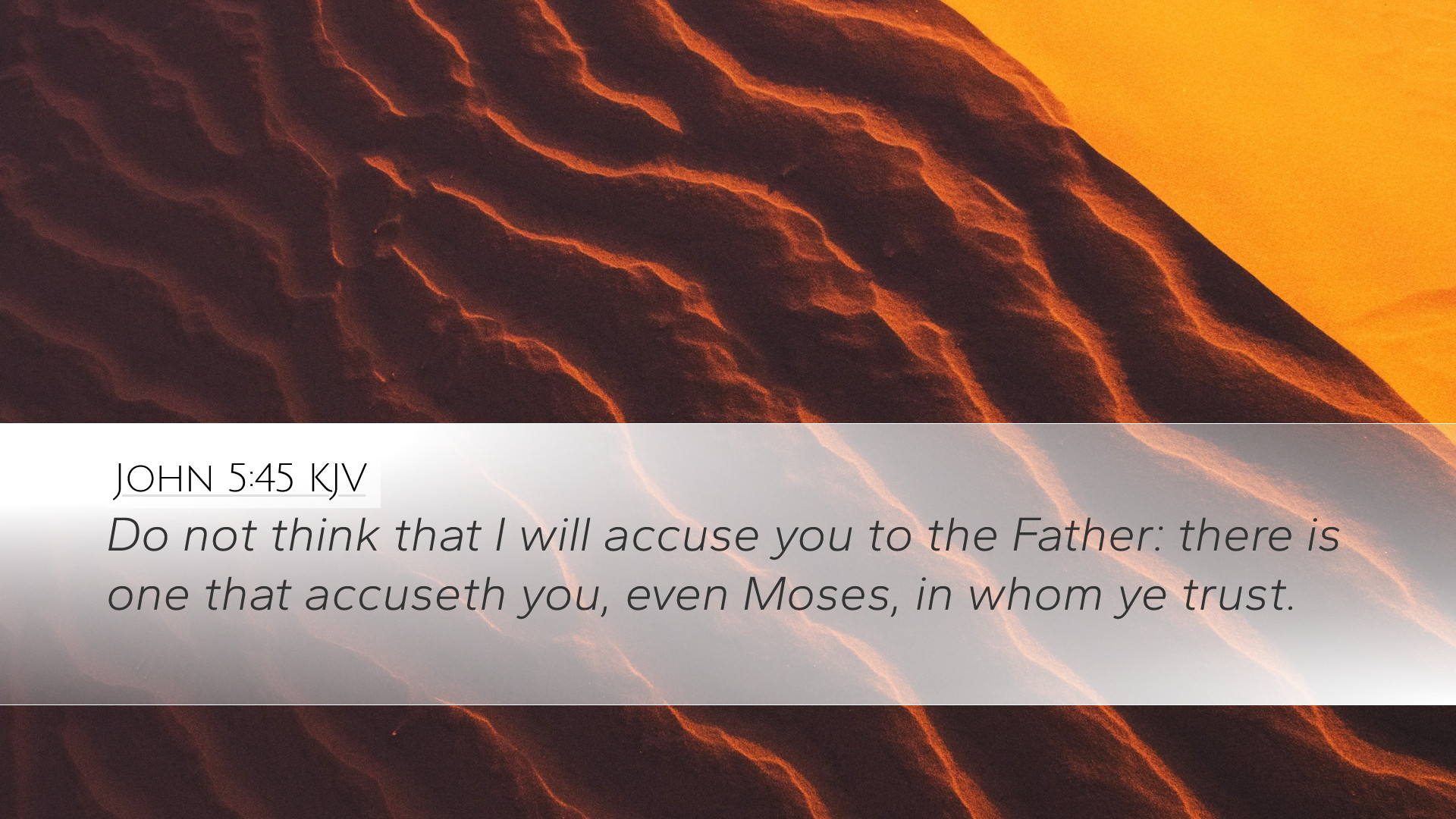Commentary on John 5:45
Verse Context: John 5:45 states, "Do not think that I will accuse you to the Father: there is one that accuseth you, even Moses, in whom ye trust." This verse is a profound declaration made by Jesus during a discourse with the Jewish authorities, revealing their misplaced faith and the weight of the Law represented by Moses.
Key Themes
- Judgment and Accusation: Jesus clarifies that He is not the one who will condemn them; instead, it is Moses to whom they look for righteousness that will ultimately turn against them due to their failure to uphold the Law he delivered.
- The Role of Moses: Moses represents the Law and the covenant between God and Israel. The reliance on the Law without recognizing its fulfillment in Christ leads to spiritual death.
- The Failure of the Religious Leaders: The leaders' trust in Moses and their rejection of Jesus as the fulfillment of the Law reveal their spiritual blindness and the danger of legalism.
Insights from Commentaries
Matthew Henry's Commentary
Matthew Henry emphasizes the futility of the Jews' reliance on their heritage and their understanding of the Law. He notes that they were so focused on the traditions established through Moses that they failed to recognize the One who was greater than Moses standing before them. Henry highlights that Jesus' message points to the fact that the Law was intended to lead them to recognize their need for grace and redemption.
Albert Barnes' Notes
Barnes takes a historical approach, discussing the significance of Moses in Jewish tradition. He explains that the Jews' veneration of Moses was rooted in a misunderstanding of the Law's purpose. They saw Moses as the ultimate authority yet failed to perceive that Moses himself bore witness to Christ (as seen in Deuteronomy 18:15). Barnes notes the irony in their trust; while they believed in the Law, the very Law they revered was designed to point them to the Messiah, whom they rejected.
Adam Clarke's Commentary
Clarke offers an interpretative view on the implications of the statement by Jesus. He asserts that Jesus disclaims the role of an accuser, positioning Himself instead as the advocate for mankind. Clarke highlights the paradox of the Jews' faith in Moses while ignoring Jesus as the fulfillment of the Law and the Prophets. He further elaborates on the spiritual implications, suggesting that Moses will ultimately serve as a witness against them due to their unbelief and disobedience to the very scriptures they claim to uphold.
Theological Implications
This verse compels serious theological reflection on the nature of faith and the Law. The Law serves a critical purpose within God’s plan, revealing sin and the need for a savior. Here are a few core theological insights:
- Christ Fulfillment of the Law: The New Testament teaches that Christ is the culmination of the Law (Romans 10:4). Understanding John 5:45 through this lens inspires a deeper appreciation of Christ's role in God's redemptive plan.
- Trust in Authority: The verse challenges believers today to reflect on whom or what they place their trust. It warns against relying solely on human traditions or interpretations of scripture without the insight of the Holy Spirit.
- Judgment and Mercy: The dichotomy presented—Jesus as the protector versus Moses as an accuser—illustrates the transition from the era of the Law to the age of grace. It invites pastors and theologians to explore the themes of judgment tempered by mercy in their ministries.
Applications for Ministry
For pastors and students preparing sermons or teachings, John 5:45 offers concrete applications:
- Preaching Grace: When addressing the congregation, it is vital to emphasize that Jesus embodies both the Law and grace. Pastors should guide their congregations to understand the transformative power of faith in Christ, as opposed to mere compliance with the Law.
- Educational Discussions: Scholars might utilize this verse to spark discussions around legalism versus relationship with Christ. Engaging congregants in conversations about the balance of faith and obedience can lead to deeper spiritual growth.
- Encouraging Reflection: Encourage congregants to reflect on their faith foundations. Are they clinging to traditions or laws, or are they in a living relationship with Christ? This reflection could be critical for spiritual maturity.
Conclusion
In conclusion, John 5:45 is a rich text that invites careful theological exploration and personal reflection. The necessity of understanding the role of the Law as a precursor to the grace offered in Christ cannot be overstated. For theologians, pastors, and students alike, this verse serves as a poignant reminder of the tension between law and grace, tradition and relationship, and ultimately challenges us to assess our own trusts and beliefs.


